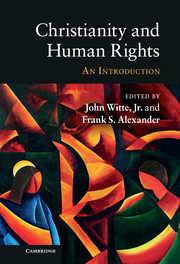Book contents
- Frontmatter
- Contents
- List of contributors
- Acknowledgements
- The first word: to be human is to be free
- Introduction
- FOUNDATIONS AND DEVELOPMENTS OF HUMAN RIGHTS
- CHRISTIANITY AND THE MODERN HUMAN RIGHTS FRAMEWORK
- 9 The human rights system
- 10 The image of God: rights, reason, and order
- 11 Religion and equality
- 12 Proselytism and human rights
- 13 Religious liberty, church autonomy, and the structure of freedom
- 14 Christianity and the rights of children: an integrative view
- 15 Christianity and the rights of women
- 16 Christianity, human rights, and a theology that touches the ground
- 17 A right to clean water
- The final word: can Christianity contribute to a global civil religion?
- Biblical index
- Index
- References
14 - Christianity and the rights of children: an integrative view
Published online by Cambridge University Press: 05 June 2012
- Frontmatter
- Contents
- List of contributors
- Acknowledgements
- The first word: to be human is to be free
- Introduction
- FOUNDATIONS AND DEVELOPMENTS OF HUMAN RIGHTS
- CHRISTIANITY AND THE MODERN HUMAN RIGHTS FRAMEWORK
- 9 The human rights system
- 10 The image of God: rights, reason, and order
- 11 Religion and equality
- 12 Proselytism and human rights
- 13 Religious liberty, church autonomy, and the structure of freedom
- 14 Christianity and the rights of children: an integrative view
- 15 Christianity and the rights of women
- 16 Christianity, human rights, and a theology that touches the ground
- 17 A right to clean water
- The final word: can Christianity contribute to a global civil religion?
- Biblical index
- Index
- References
Summary
I address two questions in this chapter: how should we conceptualize and ground the rights of children, especially with reference to the rights of parents? And what can Christianity contribute to an adequate answer to the first question? I primarily address what should be law's prima facie answer to these questions. I also show why Christianity, and the tradition of natural law which it carries, emphasizes yet also relativizes the biological relatedness and marriage of a child's parents as central to children's rights – both legal and religious. This suggests that law and religion should cooperate in guiding adults to exercise their reproductive rights in ways that guarantee that children will be raised by the parents who conceive them and that this happens within a legally institutionalized marriage.
I argue for an integrative view of children's rights. This perspective is only slightly visible in contemporary family-law theory in the United States. It is more prominent, however, in the major documents of the international human rights tradition, especially the 1948 Universal Declaration of Human Rights (UDHR) and the 1989 United Nations Convention on the Rights of the Child (UNCRC), as well as the deeper intellectual tradition, significantly influenced by Christianity, that fed these statements. This tradition has held that natural parents have the prima facie right to raise their own offspring and that children have a right to be raised by the parents who conceive them, unless there are contingencies that make this impossible or negative for the well-being of the child.
- Type
- Chapter
- Information
- Christianity and Human RightsAn Introduction, pp. 283 - 301Publisher: Cambridge University PressPrint publication year: 2010
References
- 1
- Cited by



